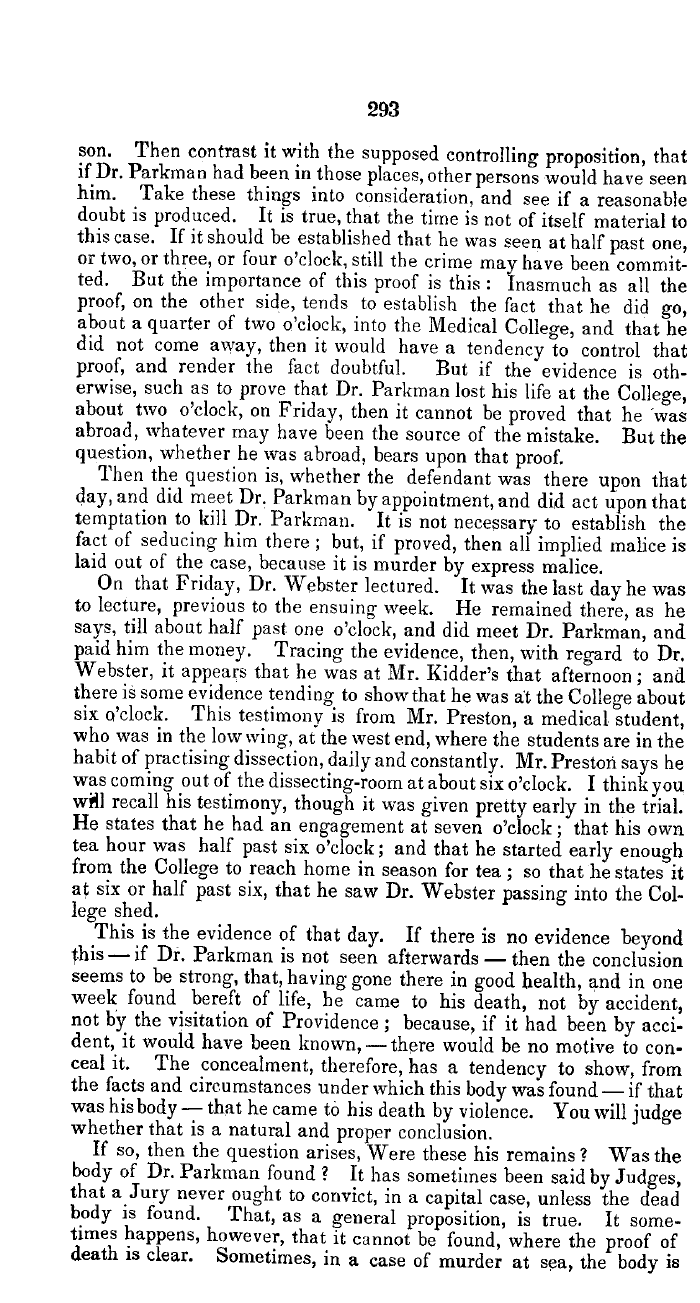|
293
son. Then contrast it with the supposed controlling proposition, that
if Dr. Parkman had been in those places, other persons would have seen
him. Take these things into consideration, and see if a reasonable
doubt is produced. It is true, that the time is not of itself material to
this case. If it should be established that he was seen at half past one,
or two or three, or four o'clock still the crime may have been commit-
ted. But the importance of this proof is this : Inasmuch as all the
proof, on the other side, tends to establish the fact that he did go,
about a quarter of two o'clock, into the Medical College, and that he
did not come away, then it would have a tendency to control that
proof, and render the fact doubtful. But if the evidence is oth-
erwise, such as to prove that Dr. Parkman lost his life at the College,
about two o'clock, on Friday, then it cannot be proved that he was
abroad, whatever may have been the source of the mistake. But the
question, whether he was abroad, bears upon that proof.
Then the question is whether the defendant was there upon that
day, and did meet Dr. Parkman by appointment, and did act upon that
temptation to kill Dr. Parkman. It is not necessary to establish the
fact of seducing him there ; but, if proved, then all implied malice is
laid out of the case, because it is murder by express malice.
On that Friday, Dr. Webster lectured. It was the last day he was
to lecture, previous to the ensuing week. He remained there, as he
says, till about half past one o'clock, and did meet Dr. Parkman, and
paid him the money. Tracing the evidence, then, with regard to Dr.
Webster, it appears that he was at Mr. Kidder's that afternoon ; and
there is some evidence tending to show that he was at the College about
six o'clock. This testimony is from Mr. Preston, a medical student,
who was in the low wing, at the west end, where the students are in the
habit of practising dissection, daily and constantly. Mr. Preston says he
was coming out of the dissecting-room at about six o'clock. I think you
will recall his testimony, though it was given pretty early in the trial.
He states that he had an engagement at seven o'clock ; that his own
tea hour was half past six o'clock; and that he started early enough
from the College to reach home in season for tea ; so that he states it
at six or half past six, that he saw Dr. Webster passing into the Col-
lege shed.
This is the evidence of that day. If there is no evidence beyond
this - if Dr. Parkman is not seen afterwards - then the conclusion
seems to be strong, that, having gone there in good health, and in one
week found bereft of life, he came to his death, not by accident,
not by the visitation of Providence ; because, if it had been by acci-
dent, it would have been known,-there would be no motive to con-
ceal it. The concealment, therefore, has a tendency to show, from
the facts and circumstances under which this body was found- if that
was his body-that he came to his death by violence. You will judge
whether that is a natural and proper conclusion.
If so, then the question arises, Were these his remains ? Was the
body of Dr. Parkman found ? It has sometimes been said by Judges,
that a Jury never ought to convict, in a capital case, unless the dead
body is found. That, as a general proposition, is true. It some-
times happens, however, that it cannot be found, where the proof of
death is clear. Sometimes, in a case of murder at sea, the body is
|

